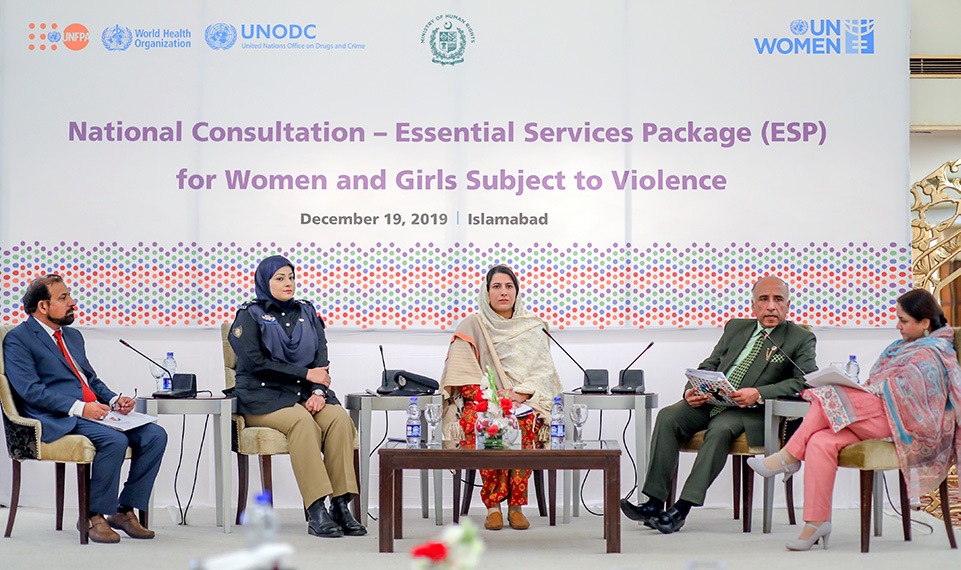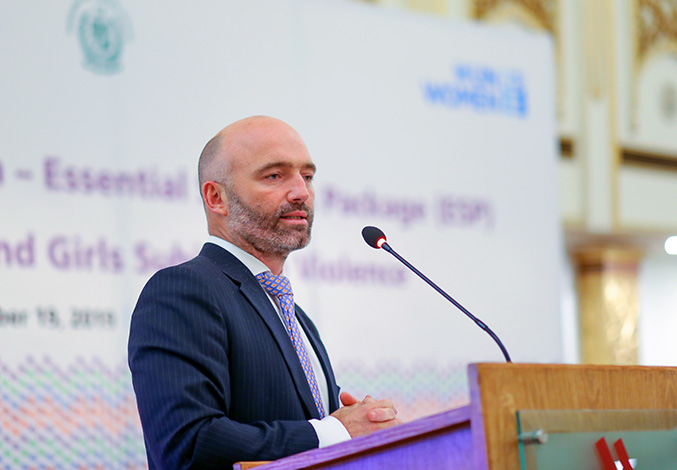Until we end violence, we must support women and girl survivors and protect them: Acting Australian High Commissioner, Brek Batley
Ministry of Human Rights, UN Women hold National Consultation on Essential Services Package for women and girls subject to violence in PakistanDate:
Islamabad, Pakistan — UN Women collaborated with the Ministry of Human Rights today to hold a national level consultation on the Essential Services Package (ESP) in order to ensure that quality services are provided to women and girls subject to violence in Pakistan.

ESP is a global Joint Programme of the United Nations on essential services for women and girls subject to violence. The aim of this programme is to provide greater access to a coordinated set of essential and quality multi-sectoral services for all women and girls who have experienced gender-based violence. The programme identifies essential services to be provided by the health, social services, police and justice sector stakeholders as well as provide a set of guidelines to improve coordination of essential services.
ESP is being piloted in Pakistan by UN Women since 2017 with UN Women as the coordinating agency in the country. Other pilot countries include: Cambodia, Solomon Islands, Kiribati, Vietnam, Tunisia, Mozambique, Egypt, Guatemala and Peru. The Joint Programme is supporting these countries to develop and adapt quality standards and guidelines for the provision of essential services, as well as providing capacity building for service providers.

Acting Australian High Commissioner, Brek Batley; Director General Federal Ministry of Human Rights, Muhammad Hassan Mangi, and Deputy Country Representative UN Women Pakistan, Aisha Mukhtar addressed the event. EVAW Advisor UN Women Pakistan, Younas Khalid gave an overview of ESP Joint Programme and UN Women’s work with government partners to respond to violence against women. Manager EVAW, Governance and HR UN Women Pakistan, Saman Ahsan gave a presentation on implementation guide of the ESP modules. Senior government officials from several national and provincial departments, donor agencies, law enforcement officials, professionals from the legal fraternity, and service providers who are working at the grassroots level attended the consultation and participated actively in the discussions.
A panel discussion on localizing ESP to respond to the needs of gender-based violence survivors engaged experts from social services, health, justice and police sectors from all four provinces to deliberate on adapting and adopting integrated approaches and aligning existing mechanisms with the global package of essential services. Subsequently, participants were engaged in a group activity to brainstorm regarding the situation and identify gaps in the existing procedures and processes to come up with recommendations for addressing them in line with ESP guidelines. The recommendations from the four groups spelt out an action plan and way forward to improve the services and mechanisms.
His Excellency Brek Batley, in his remarks, said, “Violence against women is a major impediment in the world towards achieving gender equality. Pakistan, Australia and many other countries of the world are faced with the issue of violence against women. Women and girls have the right to live free from all forms of violence. Until we achieve this right, we need to support women and girl survivors and provide them with protection and services. Australia is proud to be one of the founding donors of the Joint UN Essential Services Package programme in Pakistan. This commitment will help improve the quality of services provided to survivors of violence.”
Mr. Hassan Mangi spoke on the importance of localizing the guidelines of essential services package at district level with a comprehensive integrated approach in order to make sure no women and girl subject to violence is left behind. “It is the Federal Government’s role to take forward legislation in line with our international commitments. We always strive to ensure that we engage provincial governments and all stakeholders for consultations so that the process is inclusive and local issues and challenges are considered,” he said. “Together we need to strengthen coordination and support mechanisms so that we end exploitation and violence against women and girls.”
Deputy Country Representative UN Women Pakistan, Aisha Mukhtar, in the vote of thanks, expressed gratitude to the Ministry of Human Rights for being a strong ally in this work and the Government of Australia for supporting ESP globally. She said that one of the priorities of UN Women in Pakistan remains providing comprehensive and collaborative technical guidance on quality essential services through the development of internationally agreed guidelines and tools for enhancing the capacity of service providers.
“We hope and are confident that Pakistan will demonstrate a coherent and well-coordinated response to issues of violence against women and that today’s national consultation will bring Pakistan one step closer in fulfilling its national and international commitments to ending violence against women and girls,” Aisha concluded.
For media queries:
Habib Asgher
Communications Officer – UN Women Pakistan
T: 03468502180 | E: habib.asgher@unwomen.org